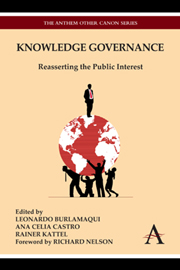Book contents
- Frontmatter
- Contents
- List of Abbreviations
- List of Tables and Figures
- Foreword
- Introduction
- Part I Knowledge Governance: Building a Framework
- Part II Innovation, Competition Policies and Intellectual Property: Institutional Fragmentation and the Case for Better Coordination
- Part III Going Forward: Towards a Knowledge Governance Research Agenda
- 7 Varieties of Latin American Patent Offices: Comparative Study of Practices and Procedures
- 8 An Interoperability Principle for Knowledge Creation and Governance: The Role of Emerging Institutions
8 - An Interoperability Principle for Knowledge Creation and Governance: The Role of Emerging Institutions
from Part III - Going Forward: Towards a Knowledge Governance Research Agenda
Published online by Cambridge University Press: 05 April 2013
- Frontmatter
- Contents
- List of Abbreviations
- List of Tables and Figures
- Foreword
- Introduction
- Part I Knowledge Governance: Building a Framework
- Part II Innovation, Competition Policies and Intellectual Property: Institutional Fragmentation and the Case for Better Coordination
- Part III Going Forward: Towards a Knowledge Governance Research Agenda
- 7 Varieties of Latin American Patent Offices: Comparative Study of Practices and Procedures
- 8 An Interoperability Principle for Knowledge Creation and Governance: The Role of Emerging Institutions
Summary
This study examines the relationships among funders, research institutions, and the “units” of knowledge creation and local knowledge governance, which are hosted inside research institutions. Our goal is to uncover the knowledge spaces where commons-based approaches, peer production and modes of network-mediated innovation have – and have not – emerged and to examine the conditions under which these approaches either flourish or are discouraged. Our rationale is that the emergence of novel, democratized and distributed knowledge governance represent a meaningful complement to more traditional systems, with the potential to create new public knowledge goods accessible to a global civil society and spur innovation in previously unforeseen ways.
The first section of this chapter is an introduction to distributed knowledge creation and open systems for knowledge transactions (including but not limited to copyrighted and patented knowledge-embedded products; see Blackler 1995).
The second section contains a case study of the complex and interlocking system of relationships governing knowledge-embedded products in the field of genomics, as well as some experimental interventions to adjust these relationships with the goal of maximizing either the total knowledge output or the value captured from the knowledge products. Although we have focused our case study on genomics, which offers a rich set of varied knowledge products and cases for study, the rationale we present in this discussion is also applicable to a variety of areas, from educational resources to alternative energy related technology.
- Type
- Chapter
- Information
- Knowledge GovernanceReasserting the Public Interest, pp. 199 - 226Publisher: Anthem PressPrint publication year: 2012
- 1
- Cited by



